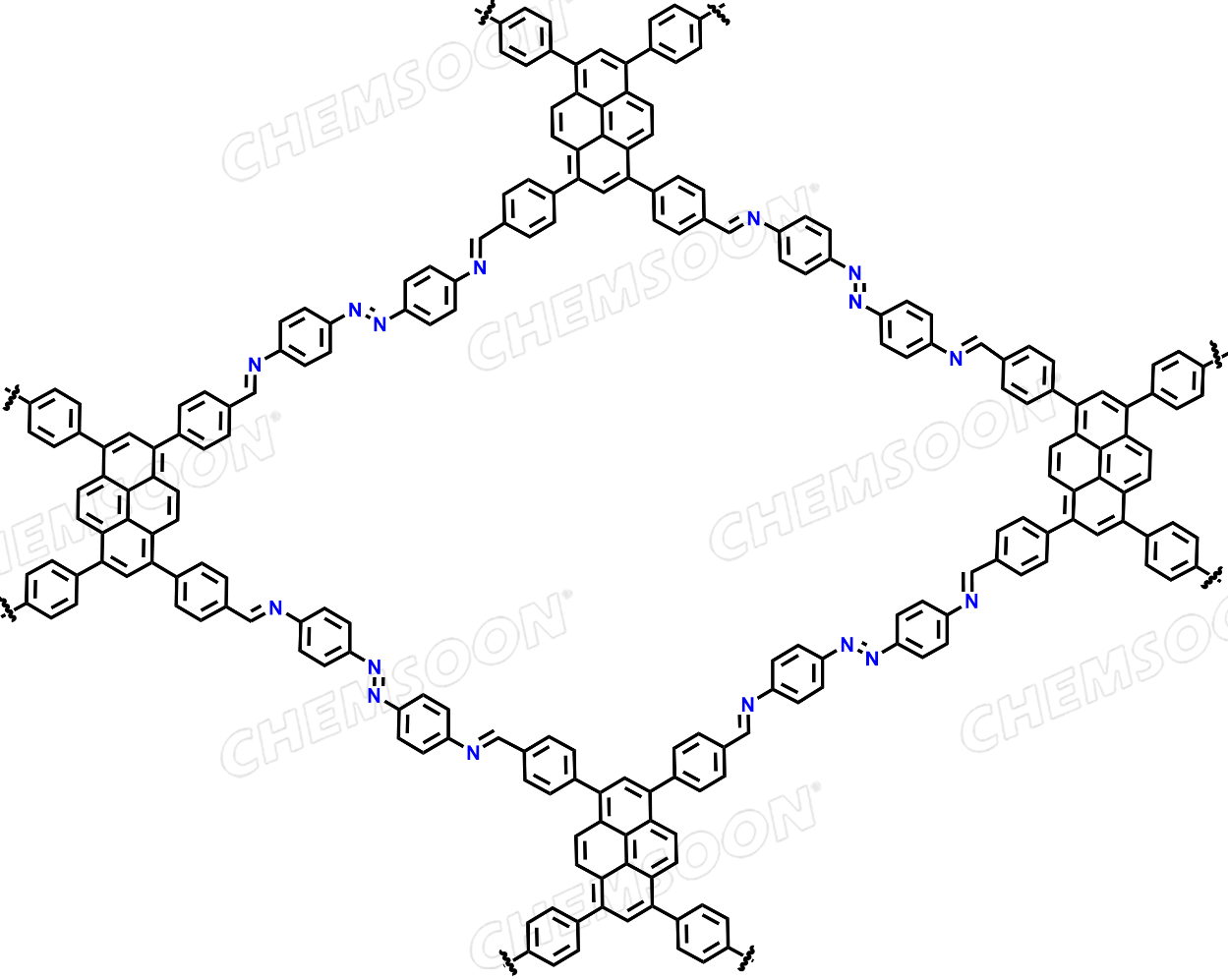
CAS:3031627-59-2
M.F.:C44H26O4.C12H12N4
M.W.:830.92532
Pricing
//
Product: Py - Azo COF (also known as Azo - COF)
Synonyms: NA
CAS:NA
Basic Information
| Unit MF. | Not mentioned | Unit MW. | Not mentioned | ||
| Coordination Metal | Not mentioned | Linkers | Not mentioned | ||
| Pore Size | Azo - COF - 1: Not mentioned; Azo - COF - 2: Not mentioned | Pore volume | Not mentioned | ||
| Surface Area | Azo - COF - 1: 276 m²/g; Azo - COF - 2: 361 m²/g | ||||
| Analog Structure | Not mentioned | ||||
Product Property
| Appearance | Azo - COF - 1: Stacked block - like shape; Azo - COF - 2: Folded shape. Color not mentioned. | |||
| Particle Size | Rod - shaped, with a diameter of 200 nm (general description, without distinguishing Azo - COF - 1 and Azo - COF - 2) | |||
Stability
1) It can maintain its crystallinity and skeleton structure after being treated with KOH solution for 3 days, showing good chemical stability. There is no mention of its stability in other solutions.
2) In terms of thermal stability, both Azo - COFs are stable below 300 °C, and the thermal decomposition temperature (15% weight loss) is higher than 400 °C.
2) In terms of thermal stability, both Azo - COFs are stable below 300 °C, and the thermal decomposition temperature (15% weight loss) is higher than 400 °C.
Preservation
1) Store in a dry and sealed condition at room temperature or low temperature.
2) Activation method not mentioned, follow the conventional preservation precautions.
Other Features
1) Fluorescence: Not mentioned.
2) It has photo - responsiveness. Under UV light driving, the Azo - COF - PET composite film can respond rapidly (< 10 s), and the bending directions of Azo - COF - 1 - PET and Azo - COF - 2 - PET films are different. It has good photothermal conversion efficiency (up to 79.3 °C for Azo - COF - 1 - PET and 85.5 °C for Azo - COF - 2 - PET) and reusability under near - infrared light irradiation. Azo - COF shows good performance as an oxygen reduction reaction (ORR) catalyst in alkaline electrolyte, with a half - wave potential of 0.68 V vs. RHE, high ORR catalytic activity, and good stability, with a retention rate of 94.8% in 0.1 M KOH electrolyte after 15 hours. The unsaturated N=N bond endows Azo - COF with typical D - A properties, a small HOMO - LUMO energy gap (2.28 eV) and a band gap (2.0 eV), which is beneficial to charge transfer. Azo - COF has a moderate adsorption strength for oxygen intermediates, with an oxygen - binding energy of 1.52 eV, close to the optimal value of 1.81 - 2.88 eV, and its O₂ adsorption capacity is larger than that of Py - COF without unsaturated bonds.
2) It has photo - responsiveness. Under UV light driving, the Azo - COF - PET composite film can respond rapidly (< 10 s), and the bending directions of Azo - COF - 1 - PET and Azo - COF - 2 - PET films are different. It has good photothermal conversion efficiency (up to 79.3 °C for Azo - COF - 1 - PET and 85.5 °C for Azo - COF - 2 - PET) and reusability under near - infrared light irradiation. Azo - COF shows good performance as an oxygen reduction reaction (ORR) catalyst in alkaline electrolyte, with a half - wave potential of 0.68 V vs. RHE, high ORR catalytic activity, and good stability, with a retention rate of 94.8% in 0.1 M KOH electrolyte after 15 hours. The unsaturated N=N bond endows Azo - COF with typical D - A properties, a small HOMO - LUMO energy gap (2.28 eV) and a band gap (2.0 eV), which is beneficial to charge transfer. Azo - COF has a moderate adsorption strength for oxygen intermediates, with an oxygen - binding energy of 1.52 eV, close to the optimal value of 1.81 - 2.88 eV, and its O₂ adsorption capacity is larger than that of Py - COF without unsaturated bonds.
Applications
1) Used to prepare light - driven soft actuators to achieve efficient UV light driving.
2) Can be used as a catalyst for the oxygen reduction reaction (ORR) in the field of green energy technology.
3) With its photothermal conversion performance, it can play a role in the field of photothermal materials.
2) Can be used as a catalyst for the oxygen reduction reaction (ORR) in the field of green energy technology.
3) With its photothermal conversion performance, it can play a role in the field of photothermal materials.
Characterizations
References
1) Zhang, Qianfan; Sun, Huangbin; Jiang, Guofang; Zhang, Aimin; Ind. Eng. Chem. Res. 2024, 63, 9772−9778, DOI: 10.1021/acs.iecr.4c00230; Azophenyl Covalent Organic Frameworks for Efficient Photothermal Conversion and UV - Driven Soft Actuators
2) Yan, Xiangyu; Wang, Bingbing; Ren, Jun; Long, Xiaojing; Yang, Dongjiang; Angew. Chem. Int. Ed. 2022, 61(41), DOI: 10.1002/anie.202209583; An Unsaturated Bond Strategy to Regulate Active Centers of Metal - Free Covalent Organic Frameworks for Efficient Oxygen Reduction